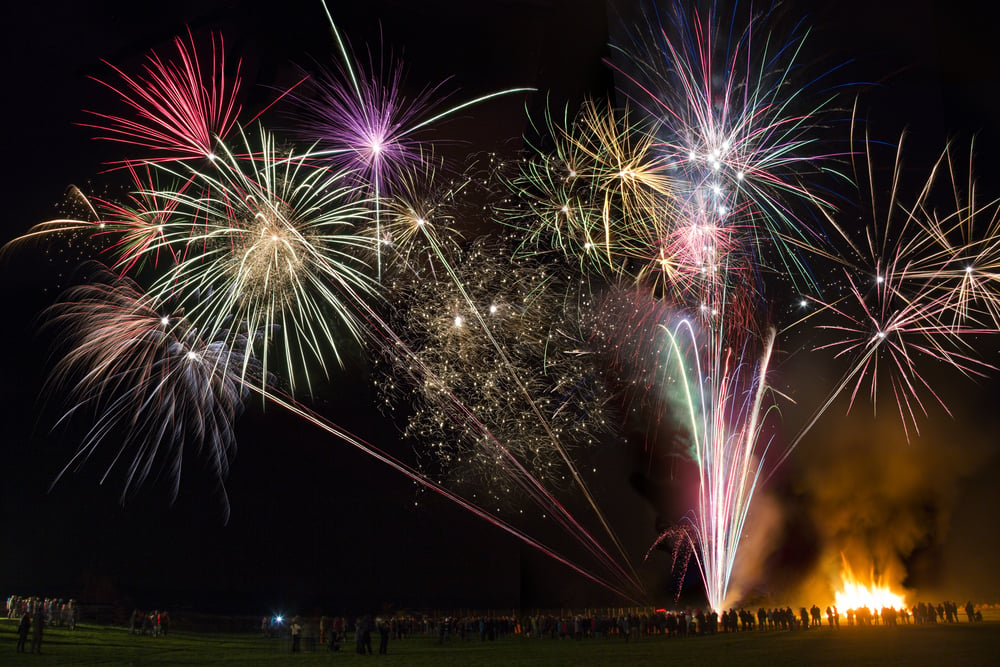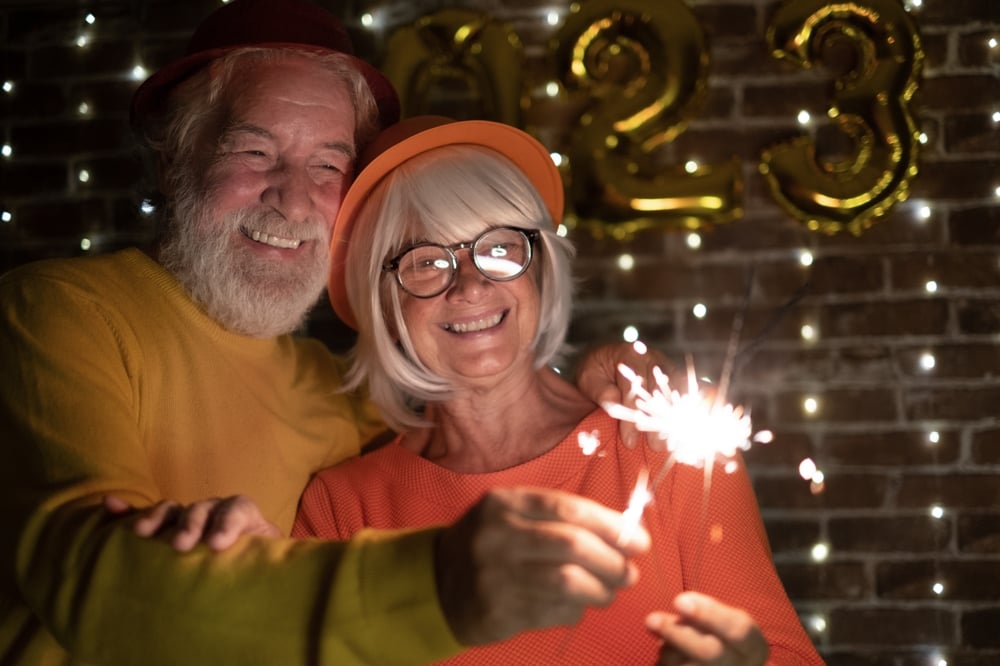Stay safe, warm and happy this bonfire night

Bonfire night celebrations are mainly held across the UK on the 5th of November, but often firework displays, whether private or public, can be held at any point during the first week or two of the month. While these celebrations can be enjoyable for many, for older people such loud and bright displays can be distressing, and even if they want to see a bonfire or a fireworks display, extra measures need to be taken to make sure they are happy and safe. So, we are discussing the tips you can follow to ensure bonfire night safety for older adults in your care home.
What are the benefits of a bonfire night celebration for older adults?
It can be the case that older people, especially those with dementia, find firework displays distressing. But it’s not necessarily the case that they will; some older adults might enjoy bonfire night celebrations, or actively want to see firework displays.
This is the perfect opportunity, at a time of year when the evenings are getting longer, to enjoy a break from routine and attend a bonfire night celebration, of which the benefits include:
- A chance to socialise with friends and family outside of the care home and allowing them the chance to spend quality time with their loved ones in an engaging and fun setting. This chance to socialise can improve confidence and motivation to remain active in the community. They have the chance to enjoy tasty food on offer at such events too.
- Sensory stimulation is acutely applicable in this scenario for those with dementia. If an older person in your care home is living with dementia, and if they do want to take part in the celebrations (in a safe and reassuring way) then the bright, vivid and loud displays of fireworks being let off, or the rich glow of a bonfire, can be a powerful source of sensory stimulation. Naturally, these same positives could be negatives, so it is very important for you to understand what the person’s preferences and feelings are, as well as the condition of their dementia, in this situation before making a decision.
- A bonfire night celebration or a firework display is the perfect opportunity for older people to reminisce about past experiences at similar events. Bonfire night has been celebrated in the UK since the late 18th Century, so is a night steeped in tradition and it is almost certainly the case that a resident has been to a bonfire night celebration at some point in their lives and might have very happy memories of it.
Can it be distressing for older adults?
- Those very same opportunities for sensory stimulation that could be a positive experience for one older person could be a significant negative for another, especially if they have dementia. It could significantly disrupt their evening routine and add to issues of sundowning, agitation or insomnia.
- The loud bangs, whizzes and bright lights could cause alarm and upset due to the overwhelming sensory changes they might experience
- Again, while some may be able to recall fond memories of past bonfire night celebrations, for others the association may be far more negative. For example, fireworks can potentially bring back unwelcome and traumatic memories of war, in particular the Blitz during the Second World War when many people living in care homes would have been children or young adults. Or it could be distressing for older people who served in the army later and experienced war. This is especially problematic if they have dementia, where they might find themselves reliving those memories as if they’re happening again.
Did you know?
Person Centred Software’s digital care planning system, mCare, employs features such as Who I Am to gather all relevant information about a person’s history to help make decisions exactly like this one.
How to stay safe this bonfire night
If you’re staying in the care home on bonfire night this year, then it’s a good idea to discuss it with the older person that you’re caring for and ask them how they feel about fireworks. Are they indifferent, do they enjoy them, and might they like to watch them from a window or doorstep, or are they actively distressed by them? It's very common for people of any age to just not like fireworks, and older people are no different. And if they have advanced dementia and are not able to communicate their wishes, you can consult the documentation available in mCare, or talk to family members, to try and find out what they might think about it.
If it is likely to cause distress, then it’s best to try and find out when the local public firework displays are happening as this can help you plan your evening to try and navigate any potential challenging issues. It might be a good idea to ask any neighbours if they are planning on setting off fireworks in their garden for the same reason.
Creating a calm environment is key on nights such as bonfire night when loud and bright firework displays, which could last until late in the evening, have the potential to cause distress. It might be a good idea to close the windows and close the curtains a little earlier than usual to help older people, especially those with dementia, transition into the evening and keep out the sudden and sharp brightness of fireworks. Putting on their favourite film, playing some music and having a sing-along, engaging in a quiz or any activity like those available on the Oomph! Wellbeing and Activities Platform - all these activities might go a long way in helping to keep care home residents engaged and keep their mind off the distress that fireworks might cause.
If they would like to watch the fireworks then it’s best to do so from inside the home through a window because by doing this, they will be protected from the cold, as well as from the worst of the loud bangs that fireworks elicit.
If you’re attending a local bonfire celebration, then taking all the necessary precautions to ensure that care home residents can enjoy the evening safely is of paramount importance. It’s always best to attend an event that is professionally organised and managed, which has appropriate safety measures in place. By attending a professionally run event, it’ll be far easier to ensure that all precautions are taken, such as standing at a safe distance from any bonfires, and that the bonfires are a safe distance from any flammable items like sheds, fences etc.
Ensure travel is safe too because sometimes events that take place on bonfire night are quite a way from the nearest accessible parking, it may be along a poorly lit road, and it may have uneven surfaces. So, it’s a good idea to check with the organisers in advance so that you know what you need to do with regards to travel arrangements, whether the ground is suitable for walking aids or wheelchairs, and it’s a good idea to check the weather too for potential rain which could make falls a higher risk.
Wrapping up warm is an obvious tip, but it’s important to remember that layers are better for occasions such as these, for example a thermal base layer under a shirt under a jumper under a coat, as it’s likely you’ll be standing outside for a long time. Regarding standing, try to make sure that there is somewhere for the older adult to sit if they become too fatigued to remain standing. It’s also a good idea to take a flask of something warm like soup or decaffeinated tea or coffee to ensure they stay warm.
Being prepared is very important because despite the obvious benefits that can be had by attending a bonfire night celebration as discussed above, how older adults, especially those with dementia, react to the fireworks could be different than how either they themselves thought they might react or how you thought they might react, so make sure you’re communicating with them, asking them how they’re feeling, if they’re enjoying themselves, and questions of that nature.
Have fun and celebrate safely with the help of our Connected Care Platform

Ultimately, if you take all the safety precautions and ensure that you plan ahead to watch out for any potential issues, a bonfire night celebration, whether enjoyed from at home or at an event, can be a very special and seasonal experience for older adults who will get the chance to engage in community spirits and spend time in a fun and different setting with family and friends.
But at the centre of bonfire night safety beyond the obvious tips like wrapping up warm or avoiding uneven ground is knowing how they might react to fireworks, whether positively or negatively, because this will inform how you approach bonfire night safety in an individualised, person-centred way.
The best way to do this is by harnessing the transformative quantity and quality of data available through Person Centred Software’s Connected Care Platform, which offers products such as mCare, which can help you understand the care home resident as well as possible to help them enjoy the evening, or Oomph! Wellness, which offers a litany of fun and engaging activities for residents and training for staff that will help you to get them through any distressed feelings that might be brought about by fireworks.
Book a demo
Find out more about how Person Centred Software's Connected Care Platform, which offers solutions in areas such as medication management, digital planning, wellbeing and activities and care home operations, can transform the way you provide care.




.png)

.jpg)
.webp?width=80&height=80&name=HTD%20Awards%202023%20Badge%20(4).webp)














